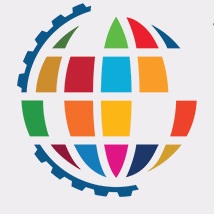
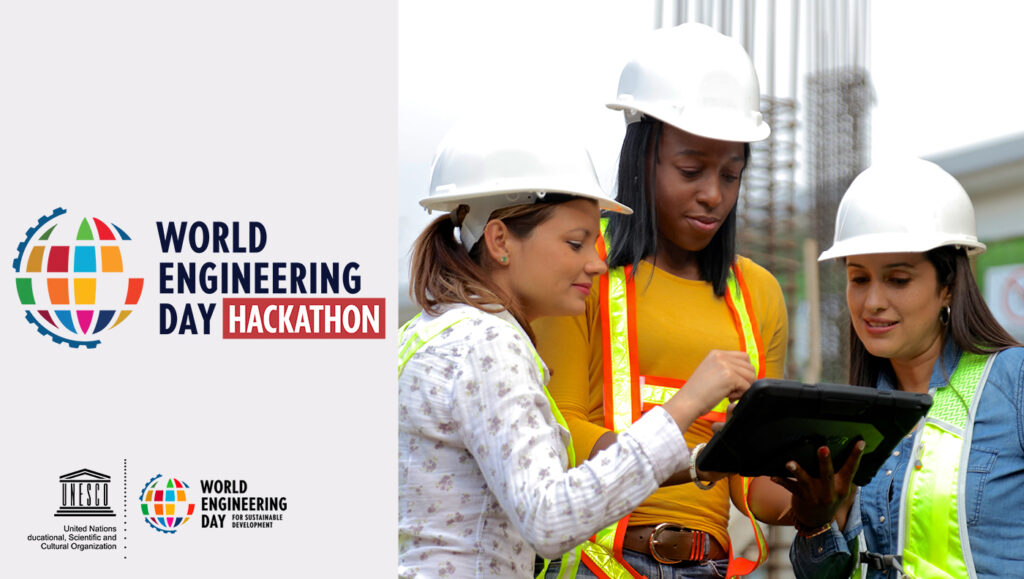
The World Federation of Engineering Organizations successfully hosted a global Hackathon for engineering students as part of the celebrations for World Engineering Day 2023.
The theme of World Engineering Day 2023 was Engineering Innovation for a more Resilient World. The Hackathon provided a focus on young engineers and engineering students and enables their participation in the celebrations of World Engineering Day from every continent around the world.
We received more than 1000 pre-event registrations of which 429 students entered. There were a total of 112 teams entering the competition from 23 countries. Our thanks to INTEL who was a PLATINUM Sponsor for the Hackathon.
The 12 Finalists were from 7 countries: Canada, China, Kenya, Mauritius, Philippines, Singapore & U.S.A
Three UN Sustainable Development Goals were selected to form the basis of the challenges for the Hackathon. This year our participants hacked SDG#2 – Zero Hunger, SDG#3 – Good Health and Wellbeing and SDG#6 – Clean Water and Sanitation.
Hackathon teams had to choose one of these and develop an innovative solution.
 The World Engineering Day 2023 Hackathon Winning teams
The World Engineering Day 2023 Hackathon Winning teams
The challenges were:
Challenge 1 – SDG #2: Feeding 10 billion people in a changing climate, How can we sustainably provide affordable, accessible nutritious diets for future populations?
Challenge 2 – SDG #6: Tackling water scarcity for future generations. How can clean water – a resource we cannot live without – be provided in a future where it’s more scarce and at higher risk of pollution?
Challenge 3 – SDG #3: The thriving city is a centre for physical and mental health and wellbeing How can we improve city design and infrastructure, by rethinking new technologies and infrastructure and retrofitting existing ones so that our urban centres become dynamic equitable places for people to live and thrive?
The winners of the World Engineering Day 2023 Hackathon
1st Prize: WFEO 2nd place – Team Sponge from Ateneo Naga University. The Philippines.
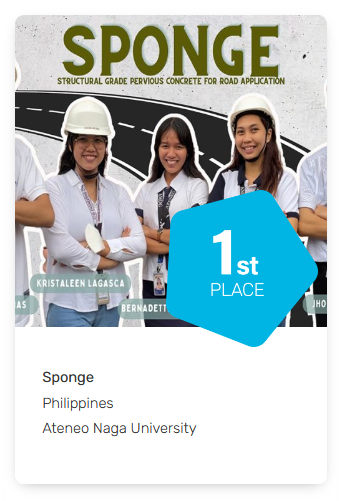 This solution addressed Challenge 3 relating to SDG3 – good health and well-being in our cities.
This solution addressed Challenge 3 relating to SDG3 – good health and well-being in our cities.
The Finalist judges commented that this entry was resourceful and innovative, repurposing waste materials including agricultural waste to produce a permeable road surface that can absorb rainwater runoff and reduce flooding and improve catchment health. The road surface also improves safety for cars in wet weather and reduces the noise from traffic, improving the health and well-being of the citizens of the city. The team made good use of digital tools to demonstrate their solution, presented the results of excellent research and produced a good video to show their solution. It was wonderful to see the team work and collaborative effort as well.
The team receives prize of €4,000.
Their submission can be viewed in this link.
2nd Prize: INTEL 2nd place – Team Aquam Soils from the University of British Columbia – Okanagan Canada.
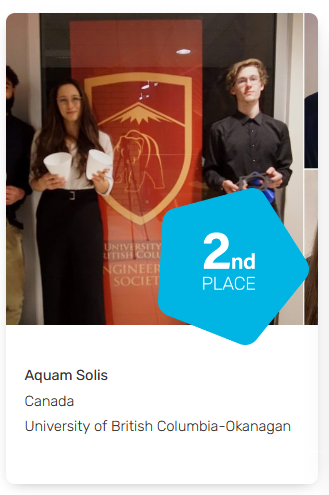 This solution addressed Challenge 3 relating to SDG6 – Tackling water scarcity for future generations.
This solution addressed Challenge 3 relating to SDG6 – Tackling water scarcity for future generations.
The judges thought this entry was an excellent innovative design to address the problem of access to clean water around the world. The design is low-cost, and easy to deploy and use especially in areas hit by natural disasters. The feasibility of deployment was well-researched. The design had been well thought out and the use of digital tools including 3D printing showed a good level of innovation. The outcome demonstrated excellent collaboration, communication and teamwork to address an important UN SDG – SDG #6.
The team receives prize of €2,000.
Their submission can be viewed in this link.
3rd Prize: Team Aqua-Smart from the University of Mauritius
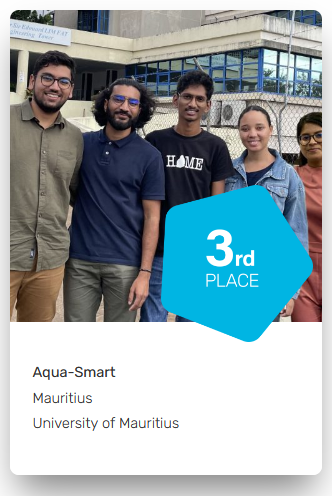 This solution addressed Challenge 3 relating to SDG6 – Tackling water scarcity for future generations.
This solution addressed Challenge 3 relating to SDG6 – Tackling water scarcity for future generations.
The judges thought that this solution provided an innovative to provide clean water to the people in remote and rural areas such as the island of Rodrigues. The innovation of repurposing existing rainwater tanks and solar panels to distil rain water represented both resource and energy efficiency. The solution made good use of digital tools to present the solution as well as to estimate its feasibility and costs and showed great teamwork.
The team receives prize of €1,000.
Their submission can be viewed in this link.
The Hackathon Process
Hackathon teams had to register on the World Engineering Day 2023 website. Solutions that were developed by the teams were required to be consistent with the theme of World Engineering Day 2023: Engineering innovation for a more resilient world. The challenges were developed in partnership with Engineers without Borders.
The judging criteria were based on the International Engineering Alliance Graduate Attributes and Professional Competencies and enabled participating young engineers and engineering students to demonstrate their abilities to produce sustainable solutions and outcomes in alignment with the Graduate Attributes.
We received over 1000 individual registrations and 112 wonderful team entries in the first round, from 23 countries around the world.
On offer as prizes was a prize pool of €8,000 with 1st place to receive €4,000; 2nd place €2,000 and 3rd place €1,000.
All participants also received a certificate of participation from the World Federation of Engineering Organisations.
Our 27 Preliminary judges from around the globe reviewed the entries and selected the top 12 entries to enter the Finalist round.
Thank you to the participants, judges and sponsors
Thank you to the engineering students from around the world who took the time to participate in World Engineering Day 2023 Hackathon.
This amazing international event has been made possible with the support of our international partners – especially Engineers Without Borders.
WFEO also thanks our sponsors whose generous contributions have enabled us to deliver this once in a life time experiences to hundreds of young engineers and students around the world, in particular INTEL who has supported the 2nd prize for the Hackathon as a Platinum Sponsor.
Thanks are also due to the working group and all the judges that made this competition possible. The preliminary judging panel comprising 27 judges who volunteered their time to assess all the projects which were received from around the world. Our five finalist judges consisted of representatives of our international partners and UNESCO. This was truly a great effort for our international competition.
Article Contributed by Dr Marlene Kanga, WFEO President 2017-2019, Finalist Judge for the WED 2023 Hackathon, April 2023.
For more information:
Hackathon page on the World Engineering Day website
World Engineering Day 2023 Reaches more than 50 million around the world
World Engineering Day 2023 edition
APR
2023
